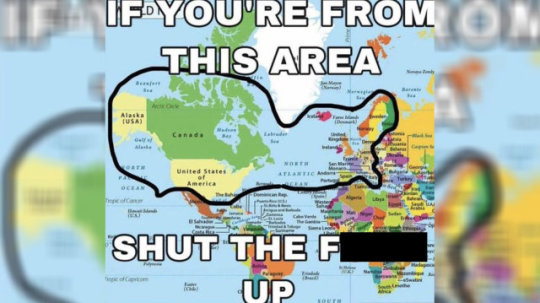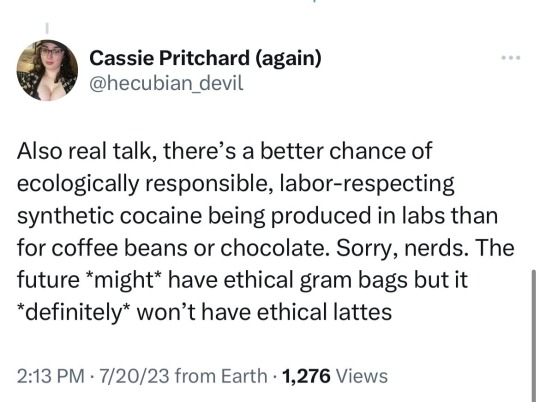#banana cocaine discourse
Note
Def a good idea to delete theculturedmarxist’s stuff, he’s also a big-time propagandist/genocide denier type. It sucks that some tankies have gotten bigger platforms recently by strike blogging.
But yeah the banana thing is insane, I *think* the original poster was using it as an example of the fact that a more just society in the US is necessarily going to be a less convenient one because convenience often comes at the expense of (domestic and international) labor exploitation, and “non-domestic crops being available year-round” is an example of a luxury that came out of said exploitation, which is A Point (though I might’ve picked something like Amazon same-day delivery to argue it…)
But then people ran with it and made it about either How Do We Stop Big Banana Through Socialism or Here’s How Bananas Can Still Win. Both at the dehumanizing expense of now-theoretical Latin American laborers of course 🙃
Oh shit that's what's happening? Tankies coasting in on strike blogging?? Gdi.
Yeah I think that was the original point too. The thing is, that US leftists keep centering US consumer demand in everything, like the entire system of global labour and resource exploitation by multinational conglomerates, aided and abetted by the IMF and World Bank and the entire colonial power matrix, can be solved by yelling at enough people about their consumption. For people who are so obsessed with class, it seems to consistently escape them that Global North consumers are also exploited and disempowered by the same oligopolies and monopolies that pay producers pennies on the dollar and sell for prices that smaller and entry-level companies can't compete with. Even as an example, bananas in the US are priced way lower than what's profitable, just to keep a monopoly of consumers. And because so many companies in the West don't pay working class people a fair wage, they have to consume the cheapest, most convenient food stuffs. So when you talk about people reducing consumption of bananas, you're asking people dependent on the cheapest nutrient sources to bear the biggest loss.
This is exactly what we mean by "no ethical consumption under capitalism". It doesn't mean we give up on the entire issue, it means that the systems of production cannot be manipulated by consumer boycotts and individual ethics. Even if one product was taken off the shelves, whatever supplanted it would be just as unethical for some group of people. It means that the solutions need to be implemented top-down, not bottom up. Global North governments need to better regulate corporate behaviour, prioritise the well-being of workers and ecological chains involving production and transport, prevent monopolies by regulating prices, and encourage and incentivize local food supply networks. And also, as some from Colombia said in a reblog about the cocaine industry, economic stress must be taken off developing nations by forgiving their IMF and World Bank loans so that they can invest the profits from their export industries in reforming agriculture and social welfare systems.
I literally do not understand why, when people directly impacted by these conditions have clear and cohesive demands and action plans, Western liberals and leftists need to come up with these completely abstract, impractical, ego-centric bullshit to create endless discourse over. They don't actually care about engaging with activists, grassroots organizations and unions in the Global South, because that involves interrogating their own paternalism, privilege and bias, and narrows the scope for the clout-chasing dunk economy.
#knee of huss#asks#anon#banana cocaine discourse#western leftists#white liberals#tankies#global south#capitalism#ethical consumption#food systems#paternalism#worker exploitation#ecological conservation#climate collapse
29 notes
·
View notes
Text
An amazing review of 1992′s Johnny Stecchino
>Roberto Benigni, the writer-director-star of "Johnny Stecchino," (at the Goldwyn Pavilion, Beverly Center Cineplex) shares one major quality with the great silent movie comics, the Chaplins and Keatons. Somehow, he seems not quite of this Earth.
With his elfin, pointy face and tiny, agile frame, he's a moon child, a glorious freak. When Benigni begins his specialty--a rapid, almost brain-dizzying patter, where his maniacal discourse and flailing arms shred all logic to tatters--his voice and persona take on weird, musical tones, like Gabrieli's trumpet with a frog in the bell.
"Johnny Stecchino," a showcase for Benigni, was the biggest box-office hit in the history of the Italian movie industry, bigger than "La Dolce Vita" or "Cinema Paradiso." But it's unlikely to strike that universal a chord here. It's a classic star vehicle: a simple romantic crime comedy about accident-prone bus driver, Dante, who unknowingly assumes the role of his look-alike Sicilian gangster, Johnny. It exists mainly to show Benigni off, let him daffily race through his repertoire.
But, if you don't recognize Benigni--and, though he's a first-magnitude Italian star, most American audiences know him only from his Jim Jarmusch films--if, in a way, you aren't rooting for him, it's not quite as funny.
The movie is a sendup of machismo and the Mafia. In it, Johnny's wife Maria (Nicoletta Braschi, Signora Benigni) and his coke-addled lawyer (Paolo Bonacelli) engineer the switch to provide the gangster's many enemies with a plausible corpse, so the real Johnny, hidden in his villa basement, can flee Palermo for Argentina. But there's another symbolic layer to this story: "Stecchino" means "toothpick" in Italian, and the "Johnny Toothpick" character is, in some sense, the evil fantasy-come-true of hapless Dante.
Like most "double" movies, from "Prince and the Pauper" to "The Prisoner of Zenda," it's a secret wish-fulfillment tale. Dante, a bumbling but benevolent little bus driver, goes woozy whenever he sees a beautiful woman. Johnny is a gravelly voiced lady-killer brute, who kills without qualm and slaps gorgeous Maria if she kisses him during sex.
And though kind little Dante, who serenades his busful of beaming, learning-impaired passengers with a jolly zoo song, shows no apparent desire to be a brutal gangster, it's down there underneath. He'd like the power, the freedom, certainly the sex.
The movie strips his id, lets him play at being bad Al Pacino. But it's a crucial plot twist that Dante never knows he's been substituted for a notorious criminal. Instead, he accepts all the crazy lies and misconceptions Maria and Johnny's shyster attorney keep feeding him: that the gourmet meals sent down to Johnny are being fed to a ravenous pet dog; that the lawyer's cocaine is diabetes medicine, snorted through a lira bill; that, when the town erupts in gunfire or half a Palermo opera audience screams for the impostor's head, it's because he's stolen a banana.
That's how Dante keeps his innocence. His naivete is immense. But no more so, really, than killer Johnny, who falls into a trance whenever he hears the word mother, and keeps complaining that the "wimp" Dante doesn't look anything like him. They're alter egos, like swinger Buddy Love and schlemiel Julius Kelp in Jerry Lewis' "The Nutty Professor," and they even have complementary personal phallic symbols: Dante's bananas and Johnny's toothpicks. When they meet, appropriately, it's in another reprise of the legendary two men and a mirror gag from Max Lindner and the Marx Brothers.
As an actor, Benigni is unique. Like Chaplin, Laurel or Hardy, he's a human mixed metaphor: a devilish cherub, a seraphic imp. (In "Il Piccolo Diavolo," he played a brash little demon who fell in love with the priest who exorcised him.) As a director, his style is big, clean, lucid. All the characters are snazzily exaggerated, and cinematographer Giuseppe Lanci's shots of Palermo have sumptuous size and spaciousness.
As a writer, like many comics, he tends to string together set pieces, sometimes illogically. Dante is boob or would-be sharpster, Maria shifts too swiftly from murderess to heroine. And it's hard to figure why everyone in town mistakes Dante for Johnny, except the police colonel to whom he confesses his "banana robbery."
What buoys "Johnny Stecchino" (MPAA-rated R for language and drug-related humor) is its impudence, its tender-hearted wackiness, its revelry in all the squirrelly quirks of Benigni's beguilingly screw-loose persona. The movie is a nose-tweak of the Mafia, government and organized religion, but there's a wide-eyed style that softens its roughest gags. That tone is wonderful, childlike, unmalicious. If not quite benign, at least it's Benigni.
2 notes
·
View notes
Text
I need someone to explain the Banana Discourse on Twitter in small words. I might be wrong, but far it looks like an argument between
Western communists deciding the economic reorganization of South America towards "self-sufficiency" by taking away the USAmerican demand for bananas, and
White liberals insisting that South America is better off with the US buying bananas from them because collapsing the industry (somehow) would take away jobs.
Because boycotts totally work, nobody else eats bananas, those are the only two options, and South American people don't have any opinions about their own economy. Pick your imperialist.

Edit: Just found out the discourse is because "we must give up bananas for the good of South American socialism" lady brought up her cocaine habit as evidence that she wasn't moralizing pleasure. On being told that the cocaine trade fuels violent crime by drug cartels across South America, she tweeted:

The nightmares of bananas and cocaine production have nothing on the take industry by the hell nexus between white women and Tankies.
#i've deleted all the posts I've reblogged by that Marxist guy#also like...you realize you can talk about multinational corporations human rights violations#and the need for tighter regulations‚ anti-trust laws#and ecological conservation help#without making it all about whether US consumerism is good or bad right?? right???#anti communist#western leftists#tankies#imperialism#colonialism#american exceptionalism#ethnocentrism#twitter discourse#knee of huss
193 notes
·
View notes